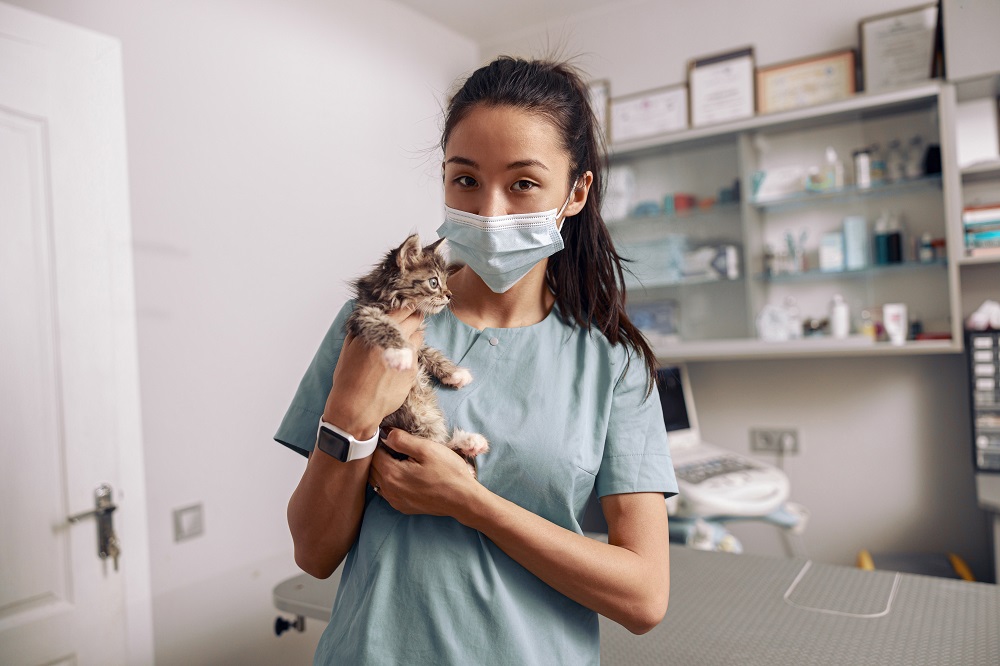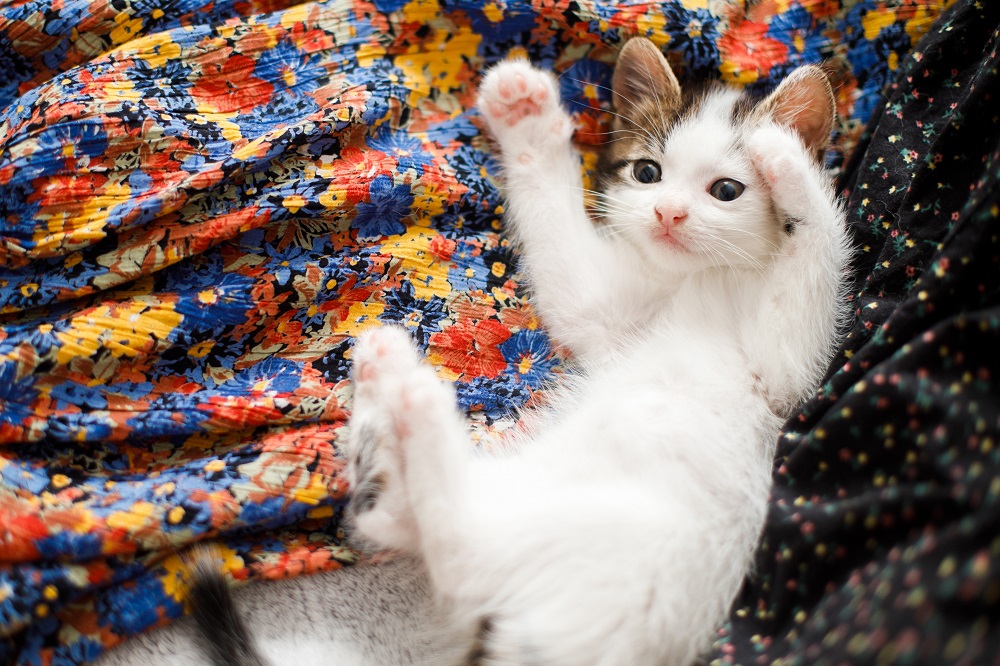Are you thinking about adopting a kitten? These are some kitten health issues every new owner should know about.
After many months of browsing and looking at so many kitten pictures on the internet, you decide to adopt one. That’s awesome! Congratulations! You bought a litter box, a bag of kibble, the mandatory Furminator, and you even threw a little party to celebrate the homecoming of your little fellow. Everything is in order and you and your family are ready to welcome it in your household.
I don’t want to ruin your mood, but as the owner of an older cat, I must advise you on how a pet will change your life. So, first of all, I decided to talk more about some kitten health issues that you may face during the first two years due to a weaker immune system.
The good news is that many of the most deadly diseases can be prevented by vaccinations. All you need to do is visit the veterinarian, register your cat, and let them take care of everything.

Feline Leukemia virus
Feline leukemia is one highly contagious kitten health issue that can be transmitted in utero from a mother cat or during nursing, as well as through casual contact like sharing food dishes or litter boxes or grooming one another.
Feline leukemia virus (FeLV) messes with the immune system and can cause some pretty serious and often deadly issues. In cats with regressive infections, the virus isn’t actively replicating, so some tests might come back negative. Even though the chances of getting sick from FeLV are usually lower in these cases, there’s still the possibility that the virus could reactivate later on.
Outdoor cats who are at a high risk of catching FeLV can benefit most from a non-core vaccine that can be used to prevent FeLV infection.
Upper respiratory infections
Too much sneezing, pink eye, and nasal discharge are three of the most common symptoms kittens have if they develop upper respiratory infections, feline calicivirus, and feline herpes virus. In most cases, these kitten health issues are caused by bacteria.
These viruses are pretty contagious, and most cats will end up running into them at some point. The good news is that there are core vaccines for both viruses. If a vaccinated cat is exposed later on, they usually don’t get as sick.
Some of the most common symptoms of these infections are mucus- and pus-based nasal discharge that has a milky appearance. In case you notice this in your kitten, please go to the vet ASAP because they might need prescribed antibiotics.
Intestinal parasites
Intestinal parasites pose a significant threat to the health of young kittens, as they can cause serious damage to their bodies. This disease can cause symptoms such as diarrhea, sudden weight loss, and an enlarged abdomen. For this particular kitten health issue, dewormers are the best way to fight it; however, in certain situations, your vet might also prescribe medication.
Inside tip: You, as a cat owner, should be aware of the intestinal parasites that affect kittens the most frequently. Some of them are: Giardia (the one that we as kids also had) can be contracted if the kitten drinks unfiltered water or comes in contact with another cat that has it.
Because they stick to the inside of the cat’s intestine and feed on blood, hookworms are likely the worst worms kittens may develop. Similar to giardia, a kitten or cat coming into contact with contaminated soil can transmit hookworms.
Then there are also the roundworms (called like that because of their spaghetti-like form) that live inside kittens’ intestines and feed on all the nutrients.
Feline immunodeficiency virus
The feline immunodeficiency virus can spread from nursing mothers to their kittens during pregnancy (in utero) or through bite wounds (blood to saliva). The immune system is the target of this retrovirus. Due to weakened immune systems, cats with FIV are more susceptible to secondary infections.
Multiple studies have shown that FIV does not shorten the lifespan of cats, and many of them can lead normal lives for years before developing health issues. Unfortunately, this is one of those kitten health issues for which there isn’t a vaccine per se. And since this condition can also create dental issues, regular visits to the vet are mandatory.
Ear mites
Among the most common kitten health issues, I should also talk a bit about ear mites. Ear mites are tiny parasites that can cause severe itching and dark debris in a kitten’s ears. Same as other health issues mentioned in the article, ear mites are also super contagious, and kittens especially might contract them through direct or indirect contact with other animals.
Thankfully, treating cat ear mites with a topical medication is quite easy and if you follow the treatment as recommended by the vet in less than 1 week everything will be fine. However, even though the visible signs of ear mites may disappear, I advise continuing the treatment for up to 3 weeks to completely eliminate the root of the problem.

Deafness
This is beyond sad because it is one of the kitten health issues that can’t be cured at all. Congenital deafness is when a kitten is born without hearing. Fortunately, this condition won’t shorten the lifespan of your beloved kitten, but you may observe that a deaf cat will play more aggressively with other cats or vocalize more loudly.
Deaf cats don’t need special care, but owners should be mindful that they might be startled awake because they won’t be able to hear someone coming. If your kitten might be deaf, it’s a good idea to keep it safe and sound inside your home!
Hypertrophic cardiomyopathy
The left ventricle’s thickening is the cause of this heart muscle disease, and some cat breeds, such as Ragdolls, Sphynx cats, and Maine Coon cats, are more likely to develop it. Although there is frequently a genetic predisposition, cats are usually not affected until they are older than five.
In other cats, the illness may develop as a secondary complication of hyperthyroidism or high blood pressure. If your cat has this illness, it’s crucial to attend regular vet checkups and see a veterinary cardiologist as well.
Polycystic kidney disease
Persian cats and related breeds are the most commonly affected by polycystic kidney disease. Unfortunately, even if this is one of those kitten health issues that isn’t identified until later in life. PKD has no particular treatment, but the symptoms of kidney failure are frequently treated with special diets, fluid therapy, and drugs that prevent phosphorus absorption and reduce nausea and vomiting.
Rabies
Rabies is a fatal viral illness that damages the nervous system. It is spread by an infected mammal biting you. Although rabies is rare in cats and kittens, the virus is so common in wildlife that it poses a major risk to domestic animals as well as people. The legally required vaccine is very effective against the virus, but if by any chance your cat gets it, there is no cure or treatment for it.
When they’re babies, cats are super energetic, so you better give them something to keep them busy somewhere away from damaging your indoor space. This cat scratching post from the MeCool Store includes a hanging ball for entertainment and is available on Amazon for just $20.97. It comes in 2 different sizes, one that’s 22 inches and is suitable for kittens and the one that’s 34 inches and is for adult cats.
Related article: Here’s How Hydrangeas Can Be Poisonous to Cats.












